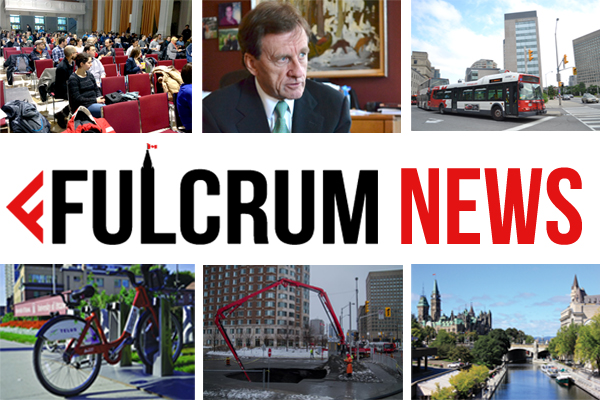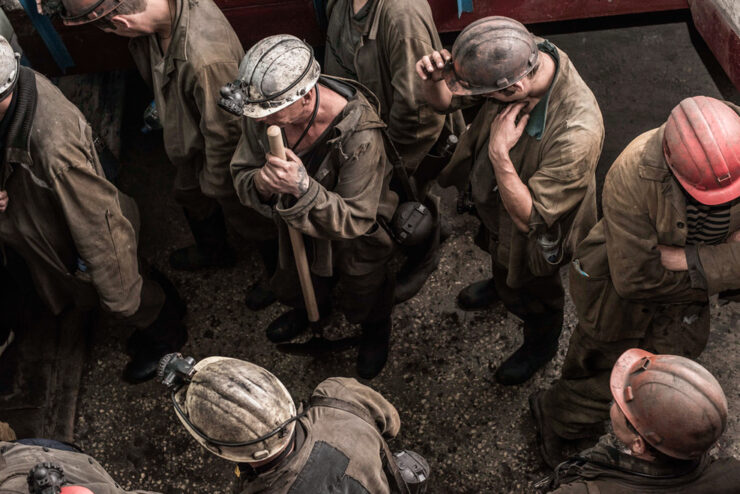Engineering details have drawn public attention away from rampant corruption
The Confederation Line has been delayed yet again, ensuring that the city’s love-hate relationship with the project will continue for another few months.
The frustration is understandable—what was marketed as a city-changing project that would reinvent OC-Transpo has turned into a quagmire of poor communication, disruptive bus detours, and a barrage of criticism from local journalists.
If the CBC were your only source of O-train news, you would see a project in flames. A recently acquired internal report details breakdowns from trains that can’t handle the winter, leaking tunnels, incompetent supervisors, and a constant flow of missed deadlines casting doubt on whether the project will ever finish. To call this view inaccurate is a polite understatement. The project stinks, but it has nothing to do with construction—its the multi-national super-conglomerates running the show that we’ve all ignored.
The scandal in Ottawa’s O-Train construction isn’t the delays, or about whether the line will run. The scandal is that the city has allowed a process that gives multinational firms unimpeded permission to use every shady trick in their arsenal.
Many of the problems the media attacks come from leaked ‘deficiency reports’—inventories of construction issues made during a routine inspection. For those in construction, these reports are an almost menial part of a worksite and almost always result in redoing poor quality work. More often than not, a leaky tunnel is not an indicator of failed engineering—it just means your concrete-pouring temp worker didn’t mix the cement right.
Reports that the train doors freeze in the winter or can’t operate in the snow neglect critical context—the train in question was left on the track overnight in the middle of a record-smashing snow storm instead of resting in the heated garage.
Claims that trains are not ready also fall apart under scrutiny as progress reports often lack specifics. A train having its certification rejected could mean the wheels will fly off, or it could mean an indicator light bulb burnt out.
Every project of any significant scale has a laundry list of issues that must be addressed before opening to the public. Your own home almost certainly had a similar list made at some point, but like a metro line, they all have to be fixed before being handed off to the customer. The engineers at Alstom and SNC-Lavalin have made dozens of similar systems in every climate in the world, from Russia to Malaysia. Give their credentials the benefit of the doubt.
The Confederation Line delays do not come from some great incompetence—it comes from a judgment call from an executive that seeks to maximize profitability over public opinion.
When Rideau Transit Group (RTG) realized they would not meet the original deadline, they could have started working triple shifts and had the line out within a month or two. However, someone did the math and realized that public outrage over a delay was not worth the overtime pay that an accelerated schedule would bring.
Infrastructure development has always been a careful balancing act—corners need to be cut in ways that often shake public trust, and unanticipated issues need subpar solutions to stay on budget, but a project still needs to function well enough that the government won’t bar the company from future work.
The Confederation Line will open, and it will do its job because RTG knows how to play this game. The Alstom Citadis Spirit trains will work in the snow because to do otherwise would mean the manufacturer’s contracts in Toronto, Montreal, and St. Petersburg will evaporate.
This game isn’t unique to Ottawa, and residents of larger metros probably find our small-town idealism around construction rather quaint. Amsterdam’s Noord-Suid Line was delayed almost seven years over difficulty with soil conditions. London’s Elizabeth line is one of the most significant infrastructure investments in the UK’s history and is running over two years behind schedule. Cost overruns in Boston’s Big Dig project nearly resulted in the builders going bankrupt, leaving a literal hole in the middle of the city.
The city’s contracting system has been designed from the ground up to allow corruption to continue unimpeded beginning with the creation of RTG. The unassuming consortium won the bid to build the new line back in 2012 to an unspectacular public reaction. However, look behind the curtain, and RTG’s past starts to catch up to it.
The partnership serves as a kind of legal buffer between the project and the firms doing the real work, fulfilling a dual role as middleman and scapegoat. When the city wants to punish a company for issues during construction, who foots the bill on RTG’s end? Is it Elissdon, the Toronto-based construction firm that broke political lobbying rules to pass friendly legislation? Is it SNC-Lavalin, the global infrastructure developer who wooed Libya’s dictator with yachts and prostitutes? Is it Dragados, a pre-fab construction megacorp fined in Spain for price-fixing?
The actual answer is unclear because these companies are allowed and encouraged to hide behind their vaguely named shell instead of taking responsibility directly for their projects.
Even the contract negotiation for the project was done behind closed doors, without any serious input or transparency for city counsellors or the public. Basic questions like whether firms passed the city’s capacity test are unable to be answered in public to protect the bidder’s ‘competitive advantage.’
If the city wants more details from RTG on the line’s progress, they need to go through an approved communications process laid out in the Public-Private Partnership (P3) agreement that gives builders the freedom to all but outright lie about progress. Timelines, milestones and ongoing work can all be fudged because City Hall’s payment system incentivizes developers to do so.
Ottawa’s payment system to RTG is based on hitting key milestones, allegedly to encourage fast construction. Fines are also imposed for missed deadlines. However, in practice, this often results in businesses exaggerating progress in cinching their next payment transfer.
Decades of ‘business-friendly’ policy at all levels of government have created a system that allows corruption to flourish. Painting RTG as a gaggle of inept construction workers, flying by the seat of their pants on a project they are unequipped to deal with is foolish and irresponsible. It hides the very real issues plaguing not just Confederation Line, but all Canadian infrastructure—a contract system that allows, ignores and encourages shady dealing.
Rideau Transit Group is a clubhouse of incredibly smart, competent, determined people who have turned both train building and corruption into an art form. Confederation Line will open soon, and when it does, it will fundamentally change how this city moves. Ottawa will be dragged into the 21st century with a state-of-the-art, low-emissions, reliable LRT line.
The train will come out looking fine, but we are leaving our democracy on the tracks.





